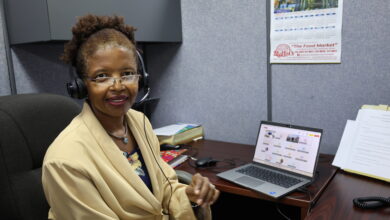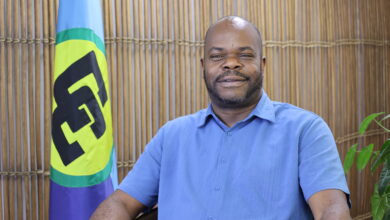Mr. President
His Excellency The Secretary-General of the Mauritius International Meeting
Distinguished Delegates
I join in thanking the Government and People of Mauritius for hosting this meeting. The quality of the hospitality, for which we extend our gratitude, has certainly served to enhance the prospects for significant achievements by the Meeting. I extend congratulations to you Secretary-General, and to your team for the organizational arrangements which have also facilitated our deliberations.
Mr. President, as we all know, the backdrop of our meeting here this week, is the recent disasters experienced first in Grenada in the Caribbean and then even more so in Asia and the Indian Ocean. Our deepest sympathy goes to the Government and families affected. But more than conveying sympathy and condolences, it behoves us, fortunate to be here, to take the decisions necessary to avoid or attenuate any repetition of such disasters. Anything less would not only be a waste of our time here, but more importantly, of the lives of those who perished.
As we meet to review the Barbados Programme of Action, the evidence from the national, regional and independent assessments, is that the economic, environmental and social conditions and resilience of SIDS in the Caribbean and elsewhere have weakened in the 1990s.
As regards our economic vulnerability, intensified competition from global trade liberalisation, deteriorating market access conditions and adverse movements in the commodity terms of trade, have led to significantly weakened export capacity, rising trade deficits, and increased economic vulnerability. CARICOM, up to the mid 1980s a net food exporting region, is now a net food importer. High cost of imported energy and a rapidly rising food import bill are among the key contributing factors.
[For CARICOM SIDS, for example, the unit value of 7 of their 11 most important exports fell between 1995 and 2000: For 5 of these exports, the decline was by more than 25 per cent. The trade deficit increased from US$1.2 billion in 1994 to US$3.4 billion in 2001.]
This is in keeping with a general trend among SIDS, which up to 15 years ago, were self reliant in food but today face a food security problem; leaving more than half of them either as net food importers or as low income food deficit countries.
All of this has taken place in the face of falling inward investment flows and aid receipts by the SIDS. In fact, in the Caribbean aid flows fell faster than the fifty per cent reduction experienced by all SIDS between 1994 and 2002. Moreover, to conform to new security standards demanded by the developed world and international institutions, CARICOM countries have also been forced to divert significant resources to meet those requirements.
Social vulnerability in the Caribbean has also increased due to persistent poverty affecting approximately one third of the population; increasing health threats such as HIV/AIDS; the loss of trained and experienced professionals [recruited by agencies from developed countries with no thought of providing capital investment resources needed for training their replacement]; widespread trafficking and increasing use of illicit drugs; and generally rising crime exacerbated by the policy of a number of developed countries of deporting to the region hardened criminals, some with the merest links thereto.
The social and economic cost of all of this has been enormous.
At the same time, our environmental vulnerability has also increased. Climate Change and climate variability have been evidenced by more frequent and stronger hurricanes and more intense droughts. In 2004, four hurricanes of category 4 or 5 – the maximum strength – combined to impact virtually every Caribbean State. The worse case was Grenada, where as we all know the destruction was near total.
Most SIDS in the Caribbean have resolved to pursue their development and the implementation of the BPoA through intensified regional cooperation and integration. In spite of the adverse conditions described earlier, the region, mainly through its own efforts, did register some significant progress. Important among these are:
The intensification of economic cooperation into the CARICOM Single Market and Economy;
The establishment of new regional institutions including the Caribbean Community Climate Change Centre, the Caribbean Regional Fisheries Mechanism and the strengthening of networks of other agencies and programmes to provide information and policy advice;
The establishment, at the level of the Organisation of Eastern Caribbean States (OECS), of an Environment and Sustainable Development Unit (ESDU) and the adoption of the St George's Declaration of Principles for Environmental Sustainability;
Adoption in 1997, of the Education and Human Resource Development Strategy;
The establishment of waste management facilities and environmental management agencies especially for ship generated waste;
Mr. President, Caribbean SIDS also recognize the role of culture and cultural industries in development, and the potential of culture to build resilience in the face of certain dramatic changes and powerful intrusions of the global society. The forging of greater partnerships – among Caribbean peoples at home and in the Diaspora – as well as alliances with the rest of the world is important in enhancing that resilience. We therefore support the call in this meeting, for a greater role for culture in sustainable development strategies and for the strengthening of the international system to assist SIDS in the preservation of their cultural heritage and the development of their cultural industries.
CARICOM continues to contend, as it did in Monterrey in 2002, that the critical development gaps between developed and developing countries namely – the human development gap, the technology gap, the knowledge and information gaps, the production gap and the trade gap – are all widening.
For the majority of SIDS, these gaps are not only widening but the states are becoming more vulnerable and, in some cases, possibly unviable. To reverse this trend and with a view to achieving the objectives of the BPoA, the outcome of this Mauritius Meeting, must, in our view, include agreement on the following six issues:
(i) A real and continuing commitment by the international community to confront the fundamental challenges to the sustainable development of SIDS, in particular the underlying causes of climate change, climate variability and sea-level rise;
(ii) Clear recommendations for policy and operational changes in the relevant fora, to ensure that multilateral trade policy provides space and mechanisms for SIDS to grow strongly and sustainably;
(iii) Provision of the resources needed to implement the measures agreed on, to reverse the existing negative economic, social and environmental trends;
(iv) The principle of exemptions for SIDS, from certain onerous obligations of some international agreements; alternatively, for the provision of resources to facilitate the meeting of those obligations;
(v) The provision of special support to build capacity, placing emphasis on Youth and Women, as part of a broader Human Resource Development Strategy;
(vi) Continued commitment of the SIDS political leadership, and the full engagement of their populations in this global campaign for their sustainable development and thus their very future as well as that of the entire international community.
Finally, Mr. President, while these recommendations do not attempt to be exhaustive, we believe that they are indispensable if we are to come to grips with breaking the stranglehold of the development constraints faced by SIDS. SIDS deserve better; the international community deserves better; the names Barbados and Mauritius deserve better.
And, Mr. President, time may not be on our side. Who knows what may happen tomorrow. I thank you.





